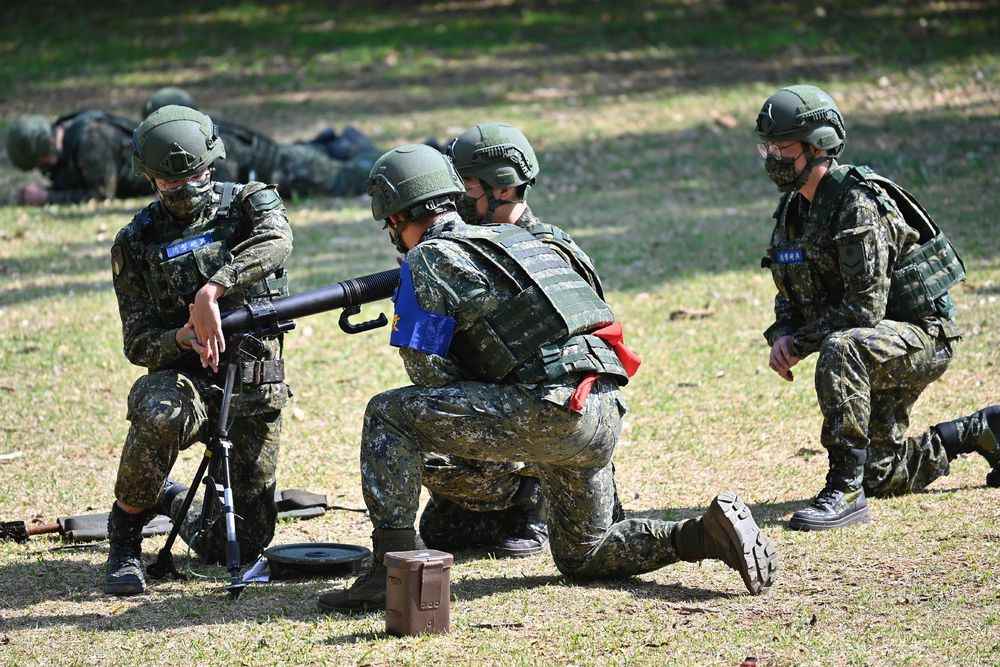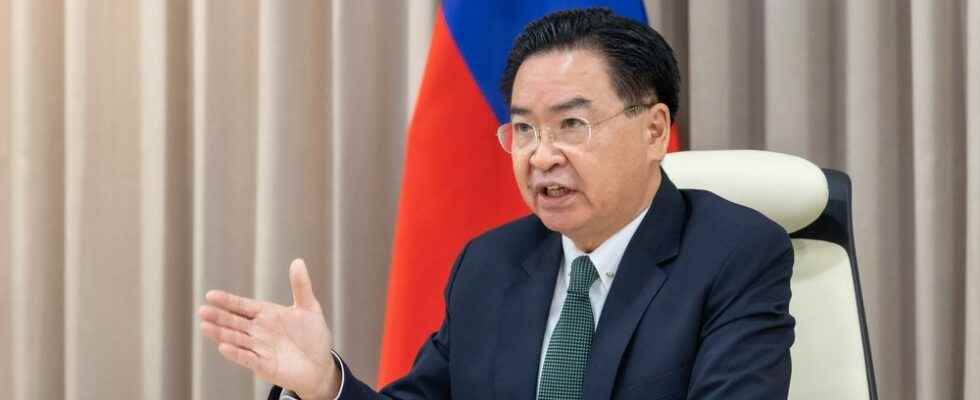Russia’s invasion of Ukraine was a shock to Taiwan. Seeing the terrible images of the war, the island understood that it could meet the same fate, so many parallels are there. A vibrant symbol of democracy in East Asia, it lives under the constant threat of an authoritarian giant, China, which considers it one of its provinces. In Beijing, President Xi Jinping, who has promised to bring the former Formosa back into Chinese rule, if necessary by force, continues to increase military pressure on Taipei. On May 31, 30 Chinese aircraft entered the Taiwanese air defense identification zone, the largest incursion since January 23 (39 aircraft). Impressed by Ukraine’s resilience, Taiwan is inspired by that country’s defense strategy and seeks to mobilize its people, says The Express Joseph Wu, the Taiwanese foreign minister.
L’Express: Has Russia’s invasion of Ukraine, launched by the Russians more than three months ago, made Taiwan more aware that China could attack it?
Joseph Wu: The Chinese military threat to Taiwan has increased dramatically over the past two years. Last year, nearly 1,000 Chinese aircraft entered our air defense identification zone. The Chinese hold sea and air military exercises around Taiwan; and they engaged in a hybrid war: cyberattacks, disinformation campaigns… The danger was therefore already very real. But the war in Ukraine has raised awareness. We are watching almost live a brutal attack by an authoritarian country on a democracy. What a war with China might look like becomes very concrete.
Joseph Wu
Credit: Ministry of Foreign Affairs of the Republic of China (Taiwan)
What lessons do you draw from this conflict: does it lead you to strengthen your military defences?
We learn a lot from the war in Ukraine. First, we found that the Ukrainians’ small, decentralized and highly agile units were very effective in dealing with a large ground army. This conflict also prompted us to prepare for an asymmetric war – to prevent the Chinese from entering our territory. This is something we are discussing with the United States, hoping to learn from the Ukrainian experience: we are trying to get more weapons for a conflict of this type.
We also saw the courageous Ukrainians defending their homeland, a real source of inspiration for us. All opinion polls show that the Taiwanese are much more determined to fight in the event of an invasion than before. We want to be able to react like the Ukrainians, and we are trying to improve our civil defence. We have created a government agency in order to prepare for the general mobilization of the population. We are also trying to train our reserve forces more effectively.
What conclusions do you think China draws from seeing Ukraine’s resistance?
China is following the war in Ukraine very closely. She tries to understand the weaknesses of the Russian army and how Ukrainians resist aggression. Beijing notes the military support of Westerners in kyiv, as well as the international sanctions aimed at the Russians. It is probably too early for them to draw definitive conclusions, but what concerns us is that the Chinese, analyzing the weaknesses of the Russian army, might want to improve their military skills.
Last fall, your government estimated that China could invade Taiwan by 2025. Has the war changed your estimates?
We look at different time horizons in which China could use force against Taiwan. But whether the attack happens tomorrow, next year, in five years or in ten years, we have to be ready. China seems to have ambitions far beyond Taiwan. Recently, Chinese bombers trained with Russian bombers in the Sea of Japan. And a Chinese aircraft carrier and its escort spawned in the Miyako Strait, southwest of Okinawa. Territorial tensions between Beijing and Tokyo, as well as between Beijing and Washington – in the South China Sea – continue to intensify. The risk of skirmishes between Chinese ships and American, Japanese or Taiwanese ships will increase, which could escalate into something uncontrollable. This is the first situation that we think could lead China to attack sooner than expected. A second factor worries us: the economic slowdown, due in particular to the confinements against Covid-19, is becoming alarming for the authorities. This could incite the communist regime to use an external crisis to divert the attention of its population.
In the event of an attack on Taiwan, will Western countries show as much solidarity as with Ukraine?
Our partners might have different reactions. But I believe that when they see that Taiwan, a democracy, is being attacked by an authoritarian country, with the risk that China will extend its influence beyond Taiwan, they will condemn the aggressor and try to support us, as they do with Ukraine. Especially if we show our determination to defend ourselves. Taiwan shares the same values as France, the United Kingdom, Germany, the United States, Canada, Australia or Japan. And we have very good relations with each other.

Reservists take part in a military exercise at the Taoyuan base in Taiwan, March 12, 2022.
afp.com/Sam Yeh
Is President Zelensky’s communication a source of inspiration for Taiwan?
Yes. President Zelensky is a very charismatic leader. He communicates through the Internet to show the international community that he is leading Ukraine’s fight against its aggressor. We have understood that even before a possible war begins, we must make the international community aware of the threats we face and the type of support we would need.
The American president has just declared that the United States would defend Taiwan in the event of a Chinese attack, is this likely to reassure you?
Joe Biden said this well, even though officials in Washington have indicated that the American policy of “strategic ambiguity” has not changed. We believe that the United States’ commitment to Taiwan is rock solid. But the defense of Taiwan is our responsibility. After all, it is our country, our people and our democratic way of life that we want to protect. Although, of course, we need the United States to strengthen our military defense capabilities.
During his visit to Japan and South Korea, Joe Biden wanted to strengthen ties with the allies of the United States against China: is this good news for Taiwan?
Generally speaking, our partners in the region want to prevent Chinese authoritarianism from spreading further. And all are strengthening their security agreements with the United States, as well as their alliances. During his visit to South Korea and Japan, Joe Biden brought together a Quad summit (United States, Australia, India, Japan). It seems that these countries agree to collaborate more in the face of the Chinese threat. Added to this is the new Aukus alliance (United States, Australia, Great Britain). Not to mention that European countries, such as France, have carried out missions aimed at guaranteeing freedom of navigation in the Asia Pacific. This desire to maintain peace and stability in this region reassures us.
At the end of 2021, you opened a representative office in Lithuania in your own name, Taiwan (and not Taipei), to the chagrin of Beijing. What is the scope of this strategic advance?
To face the pressure from China, we have to make friends. Lithuania is a very brave country. After fighting for her independence, when the Soviet Union fell, she withdrew last year from the group “17 + 1” [formé par la Chine et des pays d’Europe centrale et orientale, NDLR] . We already have a representative office of Taiwan in Vilnius, which will allow us to launch all kinds of cooperation, particularly economic.
Of course, Beijing did not like it and applied sanctions against Lithuania. But these pressures come up against the support given by the United States and the European Union to Vilnius. The Chinese think they can break the resistance of a small country like Lithuania. But if the EU unites, it constitutes a force powerful enough to resist Beijing: this is a lesson to ponder…
French parliamentarians visited Taiwan late last year, angering Beijing. Is this an important gesture in your eyes?
The French Parliament, be it the Senate, the Chamber or the National Assembly, has shown very strong support for Taiwan, by sending delegations there. This work must continue to strengthen bilateral relations between Paris and Taipei.
Taiwan is on the front line of expanding authoritarianism. If the island is attacked, it is not only Taiwan that is attacked, it is democracy. Many people say that China is huge, powerful economically and militarily, and Taiwan is very small. But remember David and Goliath: we believe Taiwan will win because we have the strength of democracies with us.
